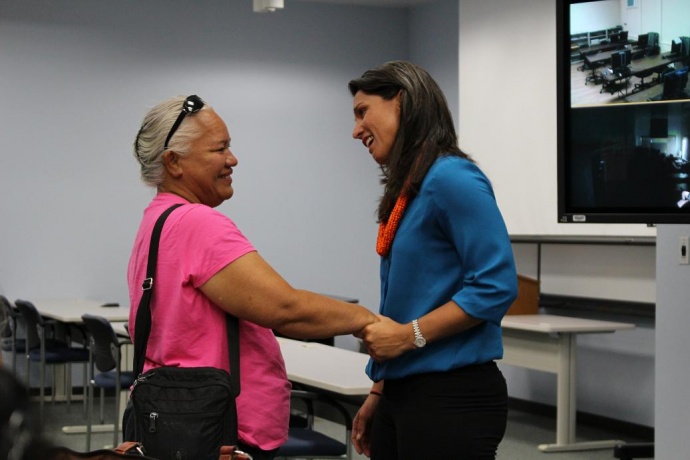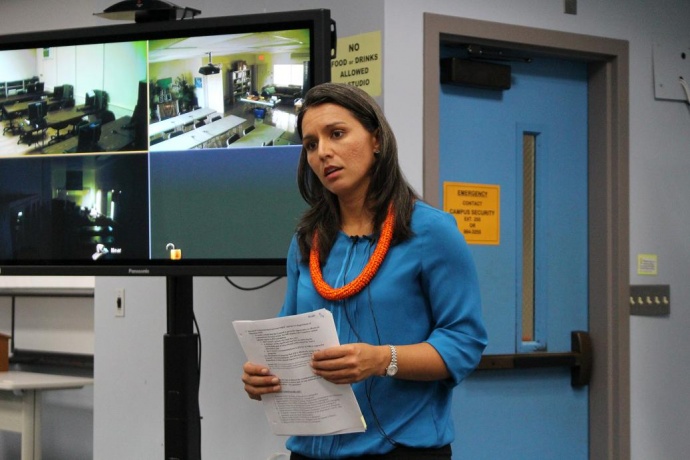VIDEO: Gabbard Hopes to Save Native Hawaiian Education Act

Rep. Tulsi Gabbard (right) speaks with Malia Davidson from the Liko A’e Native Hawaiian Leadership Program at UHMC during a stakeholders meeting for Native Hawaiian education. Photo by Wendy Osher.
[flashvideo file=http://www.youtube.com/watch?v=pdY-kfvX-3g /] By Wendy Osher
Congresswoman Tulsi Gabbard met with stakeholders in the Native Hawaiian education community on Maui today to gather input and provide an update on efforts to save programs made possible under the Native Hawaiian Education Act.
Funding for the programs faces an uncertain future in congress following the passage of a bill by a House Education and Workforce Committee on June 19, that if advanced in its current form, would completely eliminate the Native Hawaiian Education Act.
“This is obviously very troublesome to all of us here,” said Rep. Gabbard.
She explained that the Elementary and Secondary Education Act, authorizing most of the federal education programs for K-12 public education, has not been reauthorized since 2007. Now, both the House and Senate are considering reauthorization bills with revisions to improve student success and strengthen the nation’s public schools system.
“The Native Hawaiian Education Act has been a part of that measure, and has been kind of automatically funded based on those 2007 levels,” Rep. Gabbard explained.
“We’re looking at $34 million in funding that has been reauthorized, thanks to Sen. Inouye and gone directly to programs that serve Native Hawaiian children across the state. When you look at the grand scheme of the federal budget, $34 million is not a whole lot of money; but when we’re looking at the climate where the military is cancelling a $100,000 fireworks show because of budget cuts, it gives some perspective about how every dollar is being looked at,” said Rep. Gabbard.

Rep. Tulsi Gabbard (right) speaks with Maui stakeholders during a meeting discussing the future of the Native Hawaiian Education Act. Photo by Wendy Osher.
Some of the programs directly impacted and currently supported by federal funding include the Liko A’e Native Hawaiian Leadership Program at the University of Hawai’i Maui College, and Na Pua No’eau program for gifted and talented Native Hawaiian children, among others.
Rep. Gabbard joined fellow members of the Hawai’i congressional delegation in introducing stand alone companion bills, H.R. 2287 and S. 1107. The Senate bill, called the Strengthening America’s Schools Act, would also reauthorize the ESEA, but would include continued funding for programs supported by the Native Hawaiian Education Act.
The item passed out of the Senate Education Committee on June 12, but it is unclear if or when it will go to the Senate floor.
“Given the political makeup of the House and the Senate, it would be more likely to go to the Senate floor before the House would take it up. In that case, we would look at strategy from there if it did pass the Senate. But, complacency is not an option,” said Rep. Gabbard.
“We really have to make sure that we are pursuing many different avenues in case one gets stopped up for one reason or another–that we’re continuing to have options,” she said.
In the stand-alone bill introduced in the Senate, some changes were included to address issues surrounding accountability, the gathering of data, and the makeup of the councils.
“I think one great improvement is expanding eligibility for the grants to address the varying types of education, programs that are being delivered to Native Hawaiian students. The bill that I introduced makes changes to eligibility. In the most significant way, the bill allows grants to go directly to charter schools,” said Rep. Gabbard.

Rep. Tulsi Gabbard (right) speaks with Maui stakeholders during a meeting discussing the future of the Native Hawaiian Education Act. Photo by Wendy Osher.
Previously, charter schools had to go through a non-profit, “but there was always some kind of sense of gray area–not clear on how charter schools could access these funds. So this one makes absolutely clear and clarifies that charter schools can apply directly for the grants,” she said.
The Senate version of the bill also makes partnerships with public education providers including the University of Hawai’i, a higher priority, Gabbard said.
To avoid conflicts of interest, the council for the NHEA would include the appointment of 15 specified government, education, and non-profit entities. The named members may appoint designees to serve on the council in their stead, but those designees would need to have at least five years of experience in Native Hawaiian education.
“We are all very well aware of the some of the cultural differences, some of the community differences, that are not easily measured in a way that the US Department of Education might require of charter schools, or schools in other states. That’s where increased communication between the council–really spelling out unique needs, challenges, and opportunities,” comes in to play said Rep. Gabbard.












